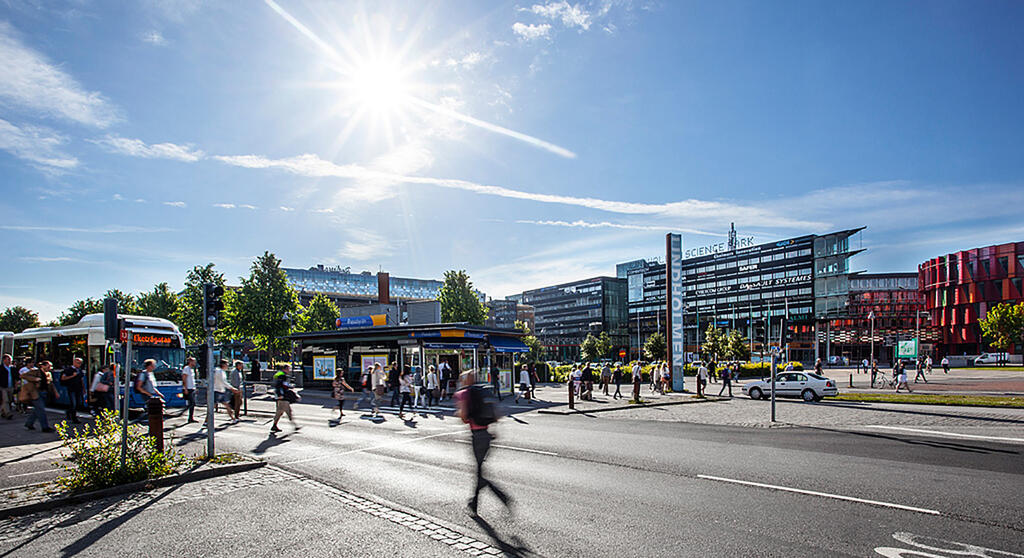LIMA
LIMA was a mobility project for people who work at or in the vicinity of Lindholmen. The aim was to simplify your everyday travel, for both work and personal purposes, using one single app.

Background
The project was part of the Swedish Government’s innovation partnership program, “The next generation’s travel and transport,” and was funded in part by Vinnova, Sweden's innovation agency, through Drive Sweden. The project developed and tested a smart, shared mobility service at a selected pilot group of people who work at Lindholmen.
Scope
Drive Sweden's LIMA project was started in 2018. Within the project, 19 partners developed a MaaS solution (Mobility as a Service) where several travel options were offered in a digital service. The project also analyzed movement patterns on Lindholmen in Gothenburg and based on them designed and positioned several mobility hubs, where they gathered several of the options in one place to make it easier for travelers to both change and find modes of travel. This and additional functions, such as a simple solution to decide whether one's employer or oneself should pay for the trip, were launched in 2020 in a larger pilot for employees of companies at Lindholmen.
During the pilot, test users were given access to public transport, taxis, electric car pool, car sharing service, parking options and a real-time map where information about several of the services could be found. During the year the pilot was active, the corona pandemic had a great effect on society, which reduced travel. The project was nevertheless able to collect valuable data and draw conclusions that can provide important input for new investments in shared and combined transport solutions. Among other things, user needs were identified, just like challenges regarding which actors should be responsible for vital parts of MaaS services.
Results and recommendation
- For MaaS to become a sustainable alternative, public transport needs to be a backbone of the system. Today, however, it is not possible for private operators to resell public transport tickets. In Sweden, the public transport companies have not taken on the role of MaaS providers either. This means a lock that needs to be addressed. This is proposed to be done by Sweden's public transport authorities receiving directives to include in their mission the development of shared mobility and MaaS in order to meet the societal interest in reducing transport's negative environmental and climate impact. At the same time, the possibility should be opened for private actors to resell public services such as public transport and loan bicycles in their commercial offers.
- Today, the possibilities for shared mobility and MaaS are limited by legislation. Among other things, the Rental Car Act means that car sharing is largely limited to companies, tax regulations make it difficult for both companies and private individuals to share cars, and complicated declaration procedures discourage private individuals from starting to share their cars. Legislation and tax rules in these cases prevent the development of shared mobility in practice and need to be adapted in a transition to a more resource-efficient society. New standards are also important. Just as it is completely natural that a car today is equipped with seat belts and airbags, in the near future it should be a matter of course that a car is equipped with a digital key that can be used for easy sharing of one's car.
- Both from users of the LIMA service and from the companies that participated, we can state that there is a perceived need for a service like LIMA, that combined mobility can lead to reduced environmental impact, easier management of employee travel and more efficient administration of travel. Collecting and simplifying access to shared mobility services is considered attractive, but it is mainly people who already have multimodal, collective and active mobility patterns who are attracted by LIMA. In order for the service to become more attractive, it is important to collect more mobility services and include an easy-to-use travel planner.
- It is employees from companies on Lindholmen who have been the focus of testing and evaluation of the LIMA service, but during the course of the project, the strongest interest in the service has been expressed from property developers in urban environments. Their motive is to replace parking spaces in newly built areas with mobility services. Although it is property developers who have the interest, it is primarily driven by municipal guidelines for parking spaces when developing new urban areas. At present, we therefore see that it is primarily a public actor, the municipality, that is demanding alternatives to the private car.
Här kan du höra takeaways från Ericsson, RISE och IUS Innovation efter att projektet gick i mål.
Project period:
2018-2021
Project partners:
Lindholmen Science Park, IUS Innovation, Ubigo, RISE, Smart Resenär, Ericsson, Veridict, Carmenta, Viscando, Snapp Car, Move About, Holmgrens Bil, Göteborgs Stads Parkering AB, Västtrafik, Älvstranden Utveckling, OkQ8, Karlastaden, Atrium Ljungberg, Chalmers.
Contact:
Sofia Löfstrand, Lindholmen Science Park
sofia.lofstrand@lindholmen.se
Vinnova number
2018-02754


